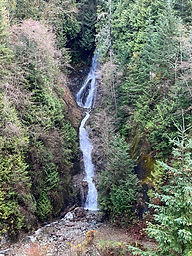Water Treatment Worries a Pivotal Election Issue

Last week, the village Climate Action Committee appealed to Lions Bay residents to protect our most valuable asset: the watershed. And at the April 18 Council meeting, long-time resident Anthony Greville, when speaking with regard to a line in the budget, made reference to the inevitability of enhanced water treatment systems for Lions Bay.
Since The Watershed takes its very name from this essential part of our village life, it seems like a good time to take a deep dive into the water of Lions Bay.
The information for this series of articles is sourced from the Drinking Water Quality 2021 Annual Report, which was written and prepared by former Public Works Manager Nai Jaffer and former Chief Financial Officer Pamela Rooke, and is available on the Lions Bay website HERE.
Water Treatment Basics
While many of the municipalities in the Lower Mainland have their water needs met by the Greater Vancouver Water District (GVWD), Lions Bay is responsible for the collection, treatment and distribution of the local water supply. Water is collected in the village through intakes in Harvey and Magnesia Creeks, and is transported through underground pipes to the treatment locations for each site. The water is first treated and then stored in two main tanks. From these tanks, the water is piped into homes throughout the village.
To meet water consumption standards, water from the intakes is first disinfected by ultra violet light (UV) to eliminate bacteria, pathogens and viruses. As a secondary disinfectant, the water is treated with sodium hypochlorite, to prevent regrowth in the distribution system and provide an early warning protocol in case of leaks and cross contamination.
Canadian water consumption standards fall under provincial jurisdiction. In BC, the provincial Ministry of Health oversees the Drinking Water Protection Act and the attendant regulations. Administration and enforcement is provided by regional Medical Health Officers, who work with municipalities to ensure safe drinking water and to notify local residents of any problems with water quality. Lions Bay's municipal water utility operates under the provisions of this act and regulations.

In the end, of course, it all comes down to people. The village has knowledgeable, qualified staff managing the water system. The chief water operator in Lions Bay is Alberto Urrutia, who is a skilled water officer. In addition to holding all the required certifications, Urrutia and the rest of the Works crew complete continuing education courses to keep their certification up to date.
But even with all this expertise, the village still faces enormous challenges – ones that could cost residents dearly. Both creeks ultimately draw on surface water, which is subject to reduced snow pack and other impacts of climate change. Over the past few years, adequate supply of water has only been maintained at the height of summer through strict conservation methods. Complicating this is the issue of consumption. On the average, Lions Bay residents consume water at a rate of just more than double the average rate of Metro Vancouver residents. Further confounding the situation is the increased turbidity of water during storm seasons, as well as the regular blockage of intakes that result from drawing water off the side of our precipitous mountain.
Costs to residents could skyrocket
To continue to maintain our water quality, the village has to meet four specific standards. A combination of two disinfection processes, zero-based treatment targets for E.coli in water samples, average daily turbidity rates maintained at an established level, and a watershed control program to minimize fecal contaminants in source water.
As noted by former Infrastructure Committee member Tony Greville at the most recent Council meeting, Lions Bay is currently not achieving the second two of these requirements. Turbidity of mountain streams is notoriously hard to regulate, but more worryingly, the vast increase of public use of our watershed makes the final standard almost impossible to meet.
The accepted solution to the above circumstance is an increased program of water filtration. However the proposed cost of this solution is in the range $5-10 million. This means that a direct cost to village residents of between $10-20,000 per household is not only possible, but looking increasingly likely.
What can you do? Residents have a large role to play in the management of water in this village. In addition to managing consumption and usage behaviour, electing an educated and informed Council is essential. The Watershed has reached out to the two candidates running for election next Saturday, as well as local members of past Infrastructure committees, to get a better sense of what will be coming down the pipe. Keep your eye on this site as we explore the issues, costs and choices facing residents with regard to this valuable resource.
Editor's Note: A previous draft incorrectly identified Lions Bay water sources as ground water. This has been corrected to read 'surface water', which includes any fresh water found in wetlands, rivers, stream systems, and lakes. Ground water is found in subterranean aquifers and wells.
This is the second in a series of articles with the goal of increasing understanding and best practices about water usage in Lions Bay. We value your opinion! Please share your thoughts below, or email editor@lionsbaywatershed.ca


Thank you kc, for educating me about our water systems and problems in such a clear manner. This is important information that every resident should understand. Is water metering an option to encourage residents to conserve?